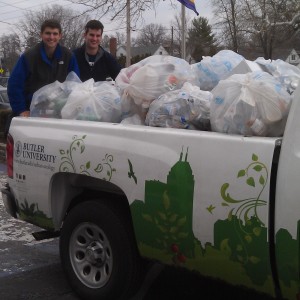by McKenzie Beverage
 Pulling the top of a recycling bin off and removing the contents in the busy atrium of Gallahue Hall is not an atypical sight. Butler’s custodial crew sweeps through the building daily, transporting our refuse to places unknown by most. But pulling the top of a recycling bin off with a class gathered around to inspect the contents and removing each item piece by piece will certainly catch the eye of passers-by.
Pulling the top of a recycling bin off and removing the contents in the busy atrium of Gallahue Hall is not an atypical sight. Butler’s custodial crew sweeps through the building daily, transporting our refuse to places unknown by most. But pulling the top of a recycling bin off with a class gathered around to inspect the contents and removing each item piece by piece will certainly catch the eye of passers-by.
“Ew, that’s disgusting!” one of my students proclaimed at the sight of a Gatorade bottle filled with chewed sunflower seeds. “Why would someone throw a Snickers wrapper in the plastic bottle recycling bin?” asked another. “Why is there so much trash in there?”
When we arrived back in the classroom I asked them to pair up into teams and sort through items placed on two different tables. I prompted them with the question, “What is recyclable?” Some of the items included: a dry erase marker, Starbucks bag with old food inside, balloon, push pin, paper clip, iPod, battery, book, small bits of paper, Solo cup, electronics charger, CDs, etc.
One team separated the items according to what they thought was recyclable on Butler’s campus. They included the iPod along with the other non-recyclables. Roughly half of their items were deemed non-recyclable. The other team separated the items according to what they thought could be donated or reused in some way. They only had one item in their non-recyclable pile—a beat up dry erase board eraser. When asked what to do with old batteries and iPods, none of them were sure. They knew they shouldn’t throw them away, but they didn’t know where to take them.
As the first sustainability coordinator for Butler, I am tasked with answering those questions and coming up with solutions to raise awareness. My job is to bridge campus operations with academics and create learning opportunities out of our waste, our buildings, our food, our trees, etc.
My first big push as sustainability coordinator is focused on trash and recycling on campus—specifically awareness. People have very emotional responses to recycling—it’s tangible and it’s ingrained in us from a very young age. Although most people want to recycle, many of them, like my students, are unsure what and how to recycle on campus. Signage varies, bins are not uniform sizes, and bin placement is inconsistent.
After discovering trash in the recycling bins, one of my students noted that there weren’t any trash bins nearby. In fact, there weren’t any on the entire floor. This may seem like a strategy to increase recycling, however it more often increases contamination (trash in the recycling). If contamination is too high, all of the recycling will be thrown in the trash. This is one of the biggest complaints I hear at Butler and it fuels negative perceptions of the way our building services team operates.
As part of Butler Earth Week programming, a student group from my class will be performing a highly visible trash audit. The contents of a dumpster will be poured out in a well-trafficked area and an Anthropology class will assist sorting through the garbage. Students will gather data to determine the percentage of recyclables and food waste in the dumpster while simultaneously raising awareness about waste on campus and educating my students. This data will help me understand what is being pitched and inform my decision about what to target in an awareness campaign and on signage. If we see those Google glasses that Tim Carter threw away, we will be sure to reuse or recycle them.
McKenzie Beverage is the sustainability coordinator for Butler University.
